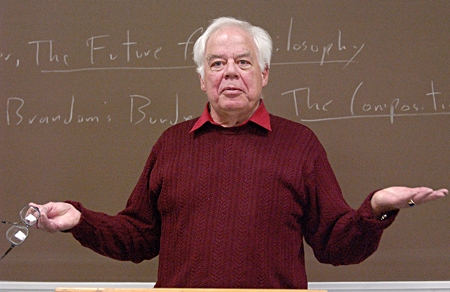 Richard Rorty – who died last week – was a playful thinker and a serious philosopher. In his time he attracted attacks from the committed left – and the equally convinced right. Great big clunking fists came at him from both directions and on both sides of the Atlantic – so he must have been getting something right in his exposure of so many raw nerves. Academic philosophers were also very sniffy about him – thinking that he dissolved their subject by showing its connections with literature and the arts generally – styles of thinking and imagining which reflected their times rather than giving access to objective truth.
Richard Rorty – who died last week – was a playful thinker and a serious philosopher. In his time he attracted attacks from the committed left – and the equally convinced right. Great big clunking fists came at him from both directions and on both sides of the Atlantic – so he must have been getting something right in his exposure of so many raw nerves. Academic philosophers were also very sniffy about him – thinking that he dissolved their subject by showing its connections with literature and the arts generally – styles of thinking and imagining which reflected their times rather than giving access to objective truth.
That kind of scepticism lined him up with ‘post-modernism’ – as well as all the other isms he was accused of indulging in – relativism, aestheticism, subjectivism, nihilism, cynicism etc etc. Post-modernism has now become an academic orthodoxy with its own career structures for those who want to play its games with meaning . That’s especially true in lit.crit with its silly semiotics as well as varieties of social science. History’s been more resistant-without some commitment to objective fact after all why bother trying to discover the truth about the past.
Rorty could certainly be silly-using ‘she’ as a neuter pronoun to describe the kind of philosophers he approved of. These were his ‘ironists’ – and included Nietzsche whose moustachioed shade was surely affronted by this denial of his chap-status. In the other camp stood the ‘metaphysicians’ – aka the main-line western philosophical tradition from Plato to Kant. Interesting enough in their time-specific way – but hopelessly off-key in thinking that god,reason,truth,justice,science are out there and discoverable. Clearly-you would go crazy if you signed up for Rorty-ism on a consistent basis. And a post-modern variety of medical science would be frightening too – ‘what you call the heart-i think im to call a kidney–just for today.’
But suspicion of doctrine was really the heart of what Rorty wanted to express. And that – once – was pretty basic to the Tory-philosophic view of the world. David Hume is the greatest Tory philosopher (and excellent historian too) – and is the ancestor to Rorty. Separating facts from values – as Hume did – was a good tool for undermining fanaticism: nowadays he’d be attacked by some doctrinaire right-ists for being such a sceptic. Coming in for attack from the left Terry Eagleton – true to Marxist form – thought Rorty was just a ‘bourgeois ironist’ He was certainly an aesthete-prefering Proust to Plato – as well as a great tease who once defined an academic philosopher as ‘someone with the ability to take seriously the opinions of Immanuel Kant.’ Lightness of touch, a witty take on reality, finding most doctrines either hilarious or vicious: they were there in Sam Johnson’s Tory coffee house-and also in Rorty.






Comments